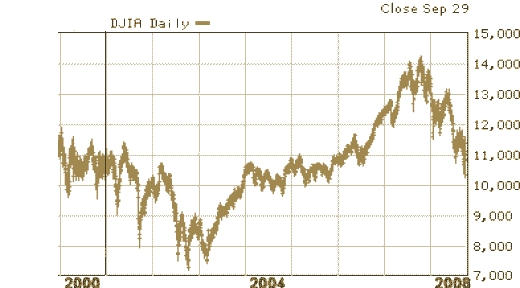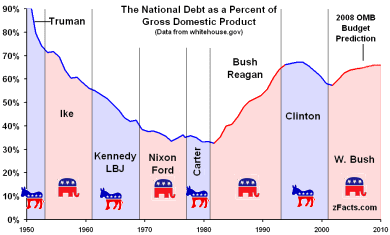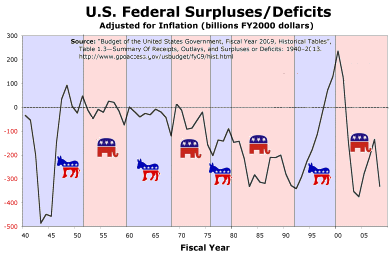House Minority Leader John Boehner (R., Ohio) said that Pelosi’s speech “poisoned” the Republican caucus and “caused a number of members we thought we could get to go south.”
“I do believe that we could have gotten there today, had it not been for the partisan speech that the Speaker gave on the floor of the House,” Boehner said. “We put everything we had into getting the vote to get there today.” Boehner added, however, that lawmakers have “no choice” but to work together and would have to find “a middle ground to bring enough votes to avert a crisis.”
Minority Whip Roy Blunt (R., Mo.) said he had 12 Republicans who would have voted for the bill but changed their minds, while Rep. Eric Cantor (R., Va.) holding up a copy of what he said was Pelosi’s floor remarks – said the speaker “frankly struck the tone of partisanship”…
It is a number that is staggering, but tells us only the costs of the Bush Administration’s failed economic policies—policies built on budgetary recklessness, on an anything goes mentality, with no regulation, no supervision, and no discipline in the system.
Democrats believe in the free market, which can and does create jobs, wealth, and capital, but left to its own devices it has created chaos. That chaos is the dismal picture painted by Treasury Secretary Paulson and Federal Reserve Chairman Bernanke a week and a half ago in the Capitol. As they pointed out, we confront a crisis of historic magnitude that has the ability to do serious injury not simply to our economy, but to the American people: not just to Wall Street, but to everyday Americans on Main Street. It is our responsibility today, to help avert that catastrophic outcome…

In fact, Pelosi doesn’t say it quite right. She’s talking about their policies, but the problem is their lack of policies. I always think that it’s what they haven’t done that will do the most damage in the long run. Reagan, Bush I, and Bush II have all operated as if they have unlimited credit. They cut taxes and government revenue, yet spend without balancing our checkbook – as shown on my [over-used] graphs:


It doesn’t take an economist to understand where that leads – it’s just simple arithmetic. It’s hard to even figure out how they have been able to get away with it so long. But, the answer is the key to the current financial crisis – we’ve had a good "credit rating." Apparently, businesses do the same thing, as do we individuals with our mortgages and our "credit" cards. We spend money, not based on what we have, but based on what we can borrow through a wide variety of instruments. And the Bush Administration has ignored the ultimate folly of such a way of operating, in part, because they have been a major part of the problem.
All of which brings us to the problem at hand. The bail-out[s] propose that the government absorb the liability for all of this bad credit "to keep our economy running." And yet the problem with that is immediately apparent – "absorb" it where? We are essentially planning to "borrow" $700 Billion to restore the "credit" market? That’s not a solution. That’s moving the problem from the individuals to the collective – as if the collective is solvent. The truth is that all of that money that’s disappearing from our retirement plans isn’t really money after all. It’s ultimately credit, vaporware, borrowed, illusion, something other than currency. Wait a minute! The word currency comes from the word current [as in right now]. And the word current [right now] ultimately comes from the word current [meaning "flow"] as in the current of the river was strong. There is a truth in the parsing of these words. We think of money or currency as having some kind of absolute value, but it doesn’t. It only has a current value. In our case, we have been living under an illusion.
So, the Republicans in the House of Representatives are right to vote down the bailout? No. Nobody’s right. That’s the problem. There isn’t any right to be had. We’ve run our economy on debt for thirty years, and there’s a price to pay for that. The "credit crunch" will slow down our economy as will a further "credit glut." The credit rating of the U.S. has gone down in the last few weeks – way down. With or without a bailout, the bad credit has been already absorbed by our government.
Sorry, the comment form is closed at this time.